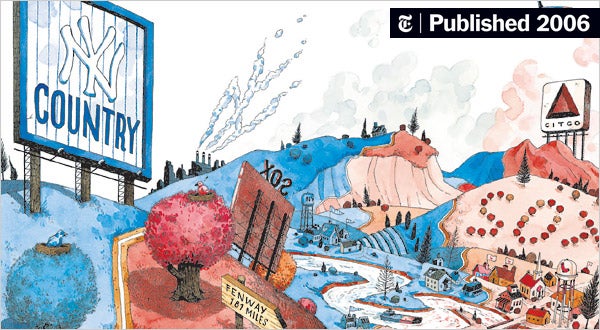
Determining the Real Line Between Red Sox Nation and Yankee Nation: A 1500-Word Analysis
The rivalry between the New York Yankees and the Boston Red Sox is one of the most famous and intense in sports history. For over a century, these two teams have not only battled it out on the field but have also become symbolic representations of regional pride, cultural identity, and historical narratives. The real “line” between the Yankees and Red Sox is not just one of geography or on-field performance, but one that runs deep through the hearts and minds of their passionate fanbases.
In order to truly understand the nature of this rivalry, we must first acknowledge the cultural and emotional weight that both teams carry. From the Yankees’ reputation as a symbol of wealth and success to the Red Sox’ identity as underdogs with a storied history of suffering, this rivalry extends far beyond just a series of baseball games. The competition between these two teams represents a microcosm of a larger cultural and societal divide. But what is the real line that divides Red Sox Nation and Yankee Nation? Is it simply about which team has the better record, or is there a deeper historical and psychological divide that continues to fuel the animosity between these two franchises?
A Rivalry Defined by History
Before we can determine where the real line is drawn, it’s crucial to take a closer look at the historical background that has shaped this rivalry. The Yankees and Red Sox have faced off for over a century, and the narrative that has emerged over the years has contributed to the emotional connection fans feel toward their teams. For many, this rivalry is not just about baseball—it’s about pride, identity, and legacy.
The Curse of the Bambino
The Yankees’ early dominance over the Red Sox was marked by the infamous trade of Babe Ruth in 1919. Known as “The Curse of the Bambino,” the sale of Ruth to the Yankees was a moment that forever altered the course of both teams’ histories. Ruth, who had been a superstar for Boston, helped lead the Yankees to unprecedented success, including seven World Series titles in the 1920s and 1930s. Meanwhile, the Red Sox, without Ruth, endured an 86-year championship drought that became a defining element of their identity.
The Curse of the Bambino became a point of deep resentment for Red Sox fans, who viewed it as an emblem of their team’s long-suffering underdog status. This narrative was reinforced by years of frustration, with the Red Sox coming close to winning the World Series multiple times only to fall short, often to the Yankees. On the other hand, the Yankees emerged as the embodiment of success, winning 26 World Series titles by the end of the 1990s, including a dynasty in the late 1990s that saw them claim four championships in five years.
The Rivalry Escalates
As the decades passed, the rivalry between the two teams grew in intensity. The Red Sox’ eventual victory in the 2004 American League Championship Series (ALCS)—a dramatic comeback from a 3-0 deficit to win the series 4-3—marked a turning point. The Red Sox finally exorcised the ghosts of Ruth and ended their championship drought, winning the World Series in 2004 and again in 2007. For many Red Sox fans, this victory was the moment they could finally say they had overcome the weight of history and the Yankees.
The rivalry has continued to simmer, with both teams often finding themselves in high-stakes situations during the regular season and postseason. Whether it’s an ALCS clash or a dramatic series in September, the stakes feel heightened whenever the Yankees and Red Sox meet. But what separates these two fanbases goes beyond the outcomes of these games. The cultural perceptions that define both teams have created a very real divide.
The Real Line Between the Two Nations
Economic and Cultural Divides
The line that separates Red Sox Nation from Yankee Nation is not purely one of sports; it is also deeply embedded in the cultural and economic differences between the two cities and fanbases. New York and Boston are two of the most influential cities in America, and their historical rivalry has extended to many aspects of American culture. The Yankees, as a symbol of wealth, power, and dominance, are often associated with the cosmopolitan, fast-paced life of New York. The franchise’s history is interwoven with that of American capitalism, corporate power, and global influence. The Yankees’ massive payroll and star-studded rosters, particularly in the modern era, have reinforced this perception of them as the team of the rich and powerful.
On the other hand, the Red Sox have long been associated with a more working-class ethos, a team that has fought against the odds to overcome historical misfortunes. Boston, a city with a strong historical connection to revolution and resistance, often views itself as the underdog in its rivalry with New York. This mentality is reflected in the Red Sox’ narrative as a team that persevered through decades of disappointment, only to emerge as champions in the face of overwhelming odds. The team’s blue-collar identity has resonated with fans who see themselves as underdogs, finding pride in their ability to persevere despite the Yankees’ dominance.
Fan Identity and Allegiances
For many fans, being a member of either Red Sox Nation or Yankee Nation goes far beyond watching baseball games; it becomes a core part of their identity. The rivalry creates fierce loyalty among fans, each side seeing the other not just as an opponent but as a symbol of everything they stand against. The constant back-and-forth between the two fanbases—whether it’s trash-talking on social media, heated conversations at work, or banter in the stands—reinforces the idea that the line between the two teams is not just about baseball, but about an ongoing cultural battle.
The Yankees, with their storied history of success, attract fans from all over the world. Their iconic pinstripes, which have stood the test of time, symbolize the team’s place at the pinnacle of baseball. But for every die-hard Yankees fan, there is a passionate Red Sox supporter who resents the Yankees’ dominance. The rivalry is often characterized by a feeling of “us versus them,” where each side believes their team represents a more authentic, true version of baseball.
The Role of the Media
The media also plays a pivotal role in shaping the rivalry and perpetuating the divide between the two fanbases. ESPN, MLB Network, and other outlets often stoke the flames of the rivalry by covering the Yankees-Red Sox games with intense focus and sensationalism. The narrative surrounding these matchups—especially in the postseason—adds fuel to the fire, as the media tends to highlight the drama and history that exists between the two teams. Broadcasts of Yankees-Red Sox games often feature passionate commentary, and the rivalry is framed in a way that heightens the stakes for fans on both sides.
Additionally, the media’s portrayal of both teams reflects and reinforces their respective identities. The Yankees are often depicted as the team of wealth and success, while the Red Sox are framed as the scrappy underdogs. This dynamic can be seen in how the teams are discussed in relation to each other, with Yankees fans sometimes being labeled as entitled, while Red Sox fans are viewed as loyal and long-suffering.
The Line Between Fanbases: Is It Real?
The question remains: is the divide between Red Sox Nation and Yankee Nation truly a “real” one, or is it just a manufactured rivalry that has taken on a life of its own? The answer is complicated. There is no denying that the rivalry between the two teams has led to significant cultural and emotional divides, but it is also important to recognize that these divides are not absolute. Fans from both sides often share a deep love of baseball and an appreciation for the history of the game, despite their allegiances.
In fact, there is a certain respect that exists between the two fanbases—an understanding that the rivalry is a central part of the fabric of baseball. While the animosity runs deep, it is also what makes the games between the Yankees and Red Sox so compelling. The intensity of the competition, the weight of history, and the emotional investment of the fans create an atmosphere unlike any other in sports.
The Enduring Legacy of the Rivalry
As we look ahead to the future, it’s clear that the Yankees-Red Sox rivalry will remain an essential part of the fabric of Major League Baseball. While both teams are evolving and the landscape of the sport changes, the real line between the two fanbases is likely to endure. The rivalry will continue to be defined by more than just the games themselves—it will remain a reflection of the cultures, identities, and emotions that have shaped these two franchises for more than a century.
In the end, the rivalry between the New York Yankees and the Boston Red Sox is not just a battle of two baseball teams—it’s a cultural war that represents a clash of identities, values, and histories. The real line between the two nations may never be entirely clear, but it will continue to divide and unite fans in equal measure for generations to come.





